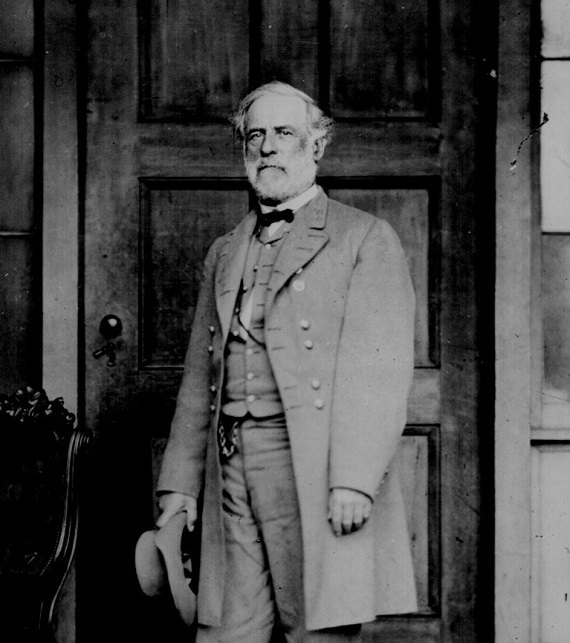Walking into the shadows, walking alone
Where the sun falls through the ruined boughs of locust
Up to the president’s office. . . .
Hearing the voices
Whisper, Hush, it is General Lee! And strangely
Hearing my own voice say, Good morning, boys.
(Don’t get up. You are early. It is long
Before the bell. You will have long to wait
On these cold steps. . . .)
The young have time to wait
But soldiers’ faces under their tossing flags
Lift no more by any road or field,
And I am spent with old wars and new sorrow.
Walking the rocky path, where steps decay
And the paint cracks and grass eats on the stone.
It is not General Lee, young men. . .
It is Robert Lee in a dark civilian suit who walks,
An outlaw fumbling for the latch, a voice
Commanding in a dream where no flag flies.
My father’s house is taken and his hearth
Left to the candle-drippings where the ashes
Whirl at a chimney-breath on the cold stone.
I can hardly remember my father’s look, I cannot
Answer his voice as he calls farewell in the misty
Mounting where riders gather at gates.
He was old then–I was a child–his hand
Held out for mine, some daybreak snatched away,
And he rode out, a broken man. Now let
His lone grave keep, surer than cypress roots,
The vow I made beside him. God too late
Unseals to certain eyes the drift
Of time and the hopes of men and a sacred cause.
The fortune of the Lees goes with the land
Whose sons will keep it still. My mother
Told me much. She sat among the candles,
Fingering the Memoirs, now so long unread.
And as my pen moves on across the page
Her voice comes back, a murmuring distillation
Of old Virginia times now faint and gone,
The hurt of all that was and cannot be.
Why did my father write? I know he saw
History clutched as a wraith out of blowing mist
Where tongues are loud, and a glut of little souls
Laps at the too much blood and the burning house.
He would have his say, but I shall not have mine.
What I do is only a son’s devoir
To a lost father. Let him only speak.
The rest must pass to men who never knew
(But on a written page) the strike of armies,
And never heard the long Confederate cry
Charge through the muzzling smoke or saw the bright
Eyes of the beardless boys go up to death.
It is Robert Lee who writes with his father’s hand–
The rest must go unsaid and the lips be locked.
If all were told, as it cannot be told–
If all the dread opinion of the heart
Now could speak, now in the shame and torment
Lashing the bound and trampled States–
If a word were said, as it cannot be said–
I see clear waters run in Virginia’s Valley
And in the house the weeping of young women
Rises no more. The waves of grain begin.
The Shenandoah is golden with a new grain.
The Blue Ridge, crowned with a haze of light,
Thunders no more. The horse is at plough. The rifle
Returns to the chimney crotch and the hunter’s hand.
And nothing else than this? Was it for this
That on an April day we stacked our arms
Obedient to a soldier’s trust? To lie
Ground by heels of little men,
Forever maimed, defeated, lost, impugned?
And was I then betrayed? Did I betray?
If it were said, as it still might be said–
If it were said, and a word should run like fire,
Like living fire into the roots of grass,
The sunken flag would kindle on wild hills,
The brooding hearts would waken, and the dream
Stir like a crippled phantom under the pines,
And this torn earth would quicken into shouting
Beneath the feet of the ragged bands–
The pen
Turns to the waiting page, the sword
Bows to the rust that cankers and the silence.
Among these boys whose eyes lift up to mine
Within gray walls where droning wasps repeat
A hollow reveille, I still must face,
Day after day, the courier with his summons
Once more to surrender, now to surrender all.
Without arms or men I stand, but with knowledge only
I face what long I saw, before others knew,
When Pickett’s men streamed back, and I heard the tangled
Cry of the Wilderness wounded, bloody with doom.
The mountains, once I said, in the little room
At Richmond, by the huddled fire, but still
The President shook his head. The mountains wait,
I said, in the long beat and rattle of siege
At cratered Petersburg. Too late
We sought the mountains and those people came.
And Lee is in the mountains now, beyond Appomattox,
Listening long for voices that will never speak
Again; hearing the hoofbeats that come and go and fade
Without a stop, without a brown hand lifting
The tent-flap, or a bugle call at dawn,
Or ever on the long white road the flag
Of Jackson’s quick brigades. I am alone,
Trapped, consenting, taken at last in mountains.
It is not the bugle now, or the long roll beating.
The simple stroke of a chapel bell forbids
The hurtling dream, recalls the lonely mind.
Young men, the God of your fathers is a just
And merciful God Who in this blood once shed
On your green altars measures out all days,
And measures out the grace
Whereby alone we live;
And in His might He waits,
Brooding within the certitude of time,
To bring this lost forsaken valor
And the fierce faith undying
And the love quenchless
To flower among the hills to which we cleave,
To fruit upon the mountains whither we flee,
Never forsaking, never denying
His children and His children’s children forever
Unto all generations of the faithful heart.






